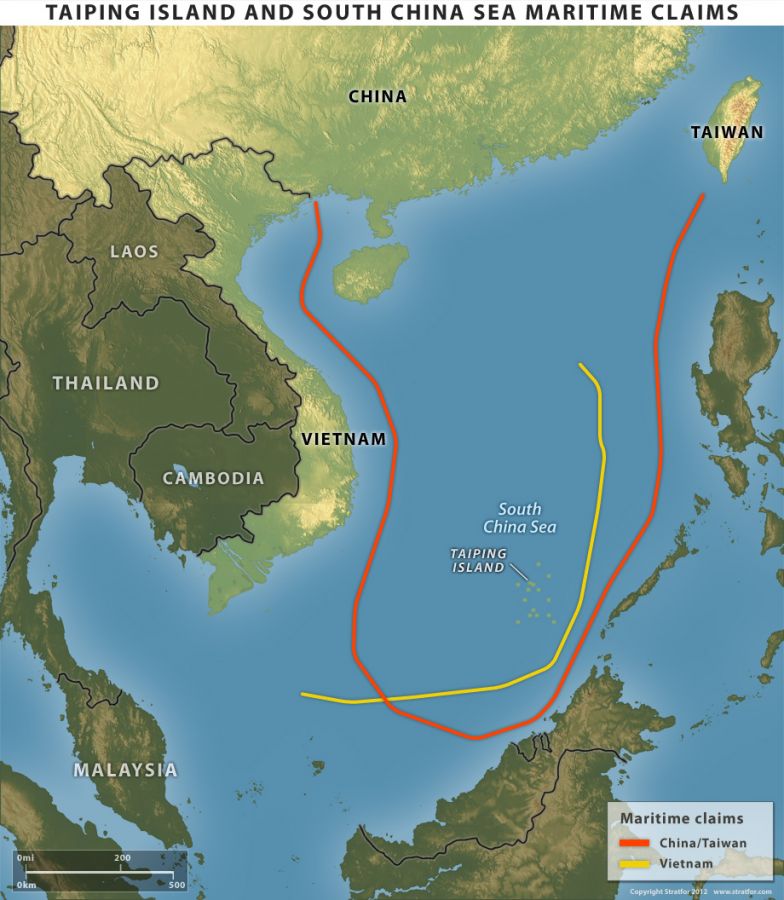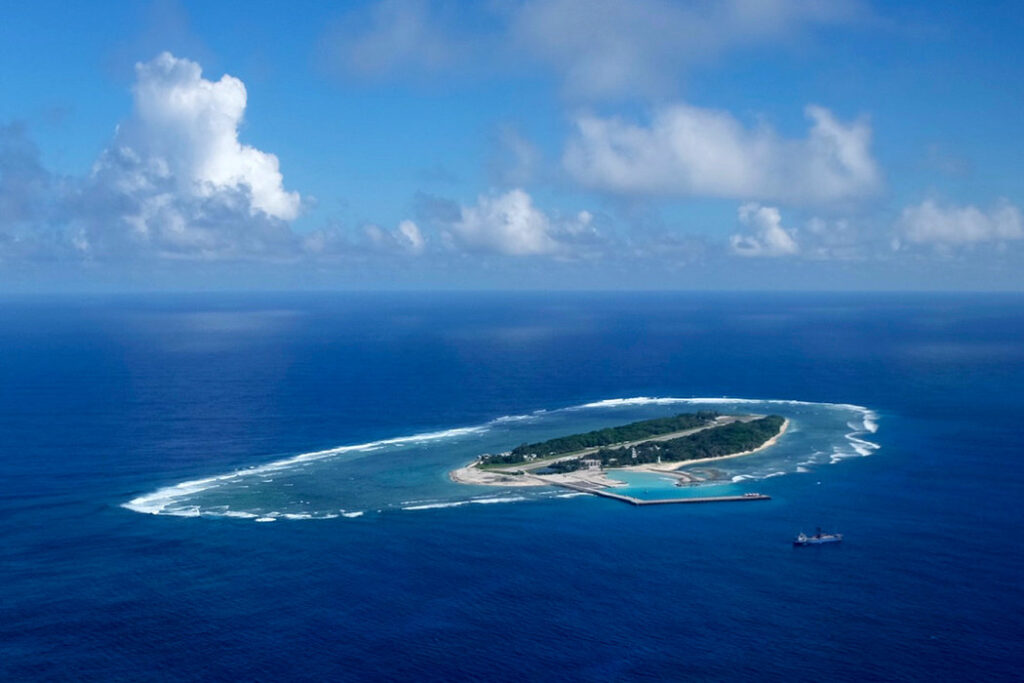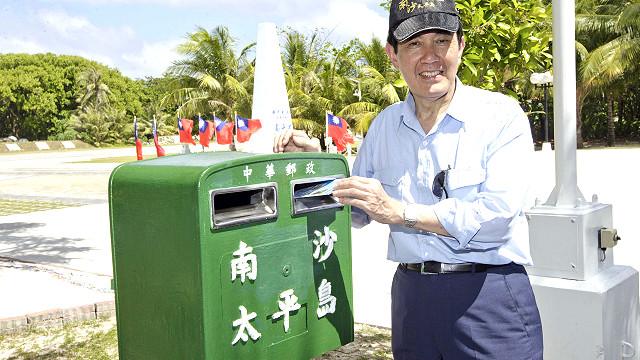
The Coast Guard Administration of Taiwan launched the Nansha Taiping Island harbor side dredging and wharf renovation project on March 18. Despite nearing the end of her term in May, Tsai Ing-wen has not visited Taiping Island during her tenure, raising doubts among residents.
Reported by Taiwan’s media on the 18th, the project held a completion and opening ceremony. Advance personnel departed on the Miaoli-class patrol vessel days earlier, reaching Taiping Island on the 17th. Taiwan military officials were also in attendance.
Tsai Ing-wen’s office itinerary reveals attendance at the ESG Fourth International Summit on Sustainable Taiwan at 9 a.m. on the 18th and a Ministry of Education event at 3 p.m. No visit to Taiping Island is scheduled. Whether Tsai Ing-wen will visit Taiping Island before leaving office is now a focal point.
Kuomintang Chairman Eric Li-luan Chu remarked on the 19th that, as Taiwan’s leader, Tsai Ing-wen should inspect and support local coast patrol personnel by visiting the island, akin to her predecessors Chen Shui-bian and Ma Ying-jeou. He believes she has no reason not to go.

The Kuomintang Legislative Yuan caucus held a press conference on the 19th, calling on Tsai Ing-wen to follow Chen Shui-bian and Ma Ying-jeou in landing on Taiping Island to declare “sovereignty.”
Hsu Chiao-hsin, deputy secretary-general of the party group, said that if Tsai Ing-wen does not land on Taiping Island, the Legislative Yuan “Foreign Affairs and National Defense Committee” will make arrangements for landing on the island, and the Kuomintang will assume relevant responsibilities. Johnny Chiang Chi-chen, Taiwan’s Vice President of the Legislative Yuan, posted on Facebook on the 18th that he expected Tsai Ing-wen to board Taiping Island in person, and that he was willing to accompany him there to defend “sovereignty” with actions and show his determination not to give in an inch of territory.
Weng Hsiao-ling, a “legislator” of the Kuomintang, said that it is really unreasonable that Tsai Ing-wen has never visited Taiping Island during her eight-year term. Kuomintang “legislator” Wang Hungwei said that it is very regrettable that Tsai Ing-wen has never planned to land on the island due to pressure from the United States. The DPP only talks about “maintaining sovereignty and not giving up an inch of territory” all day long without real action.
Taiwan People’s Party “legislator” Lin Kuo-cheng also said that everyone knows that the Coast Guard is stationed on Taiping Island. Tsai Ing-wen went to inspect and cut the ribbon before leaving office and was “optimistic about its success.”

Chuang jui-hsiung, secretary-general of the Democratic Progressive Party’s “Legislative Yuan” caucus, claimed on the 19th that the current situation in the South China Sea continues to heat up, and whether Taiwan leaders want to land on Taiping Island should be properly planned.
Rosalia Wu, secretary-general of the Democratic Progressive Party’s “Legislative Yuan” caucus, once again directed blame towards the mainland, questioning whether the Kuomintang’s timing in raising this issue was influenced by pressure from mainland China. She stated that while she respects the decisions made by Tsai Ing-wen’s office regarding the visit to Taiping Island, whether to go or not ultimately lies with Tsai. The DPP caucus declined to comment further.
Following the completion of the Taiping Island Airport in late 2007, both Chen Shui-bian and Ma Ying-jeou visited Taiping Island during their respective terms and proposed initiatives such as the “Nansha Initiative” and the “South China Sea Peace Initiative.”
Earlier this year, Ma Ying-jeou issued a statement supporting Tsai Ing-wen’s potential visit to Taiping Island. He argued that this action pertains to “territorial sovereignty” and could contribute to maintaining peace in the South China Sea region.
In February, Taiwan’s former Secretary-General of the National Security Council, Su Chi, predicted a 90% chance that Tsai Ing-wen would not visit Taiping Island. He cited tensions between the Philippines and mainland China, along with the United States’ reluctance to involve Taiwan in South China Sea matters, as primary reasons.

Concerns about personal safety also weigh heavily on Tsai Ing-wen’s decision. Su Chi highlighted the significant distance to Taiping Island and the mainland’s formidable military presence.
Media analysis on the island suggests that despite Ma Ying-jeou’s decision to visit Taiping Island during his term, Tsai Ing-wen faces different circumstances. Landing on Taiping Island could be perceived as endorsing the One China policy, which Tsai Ing-wen may wish to avoid. Additionally, concerns about displeasing the United States hinder decisive action.
Critics argue that Tsai Ing-wen’s hesitance to visit Taiping Island stems from fear of US repercussions, portraying her administration as indecisive in international affairs.
The Taiwan Affairs Office of the State Council’s statement on Ma Ying-jeou’s visit underscored the complexities surrounding Taiwan’s engagement in South China Sea matters.
Editorials in Taiwanese media emphasize the need for Taiwan to reassess its dependence on the United States and urge Tsai Ing-wen to overcome concerns about displeasing the US. Avoiding a visit to Taiping Island could be seen as a sign of weakness in the political landscape and negative reaction to the One China policy.
(Source: Global Times, Stratfor, BBC)



